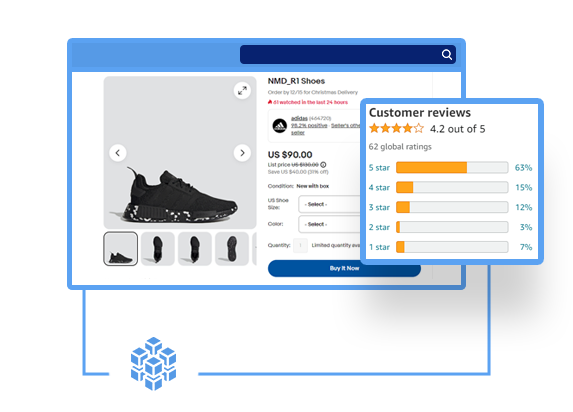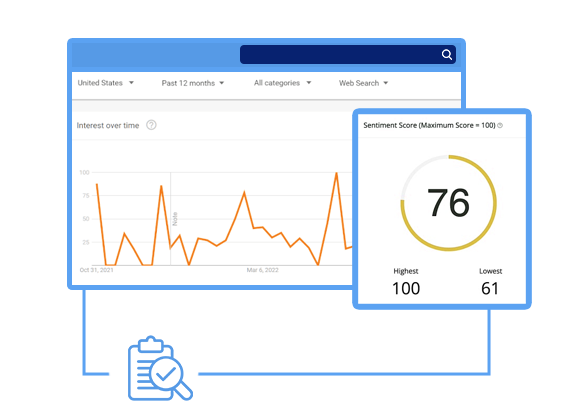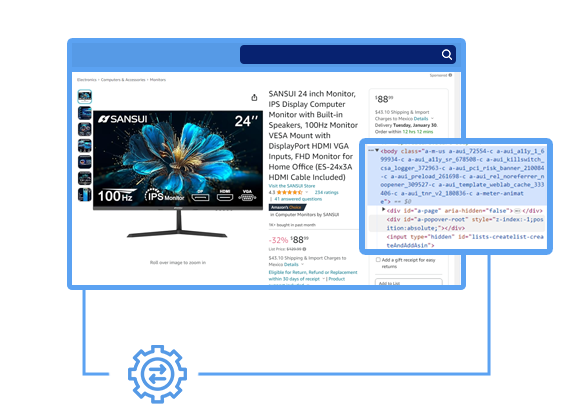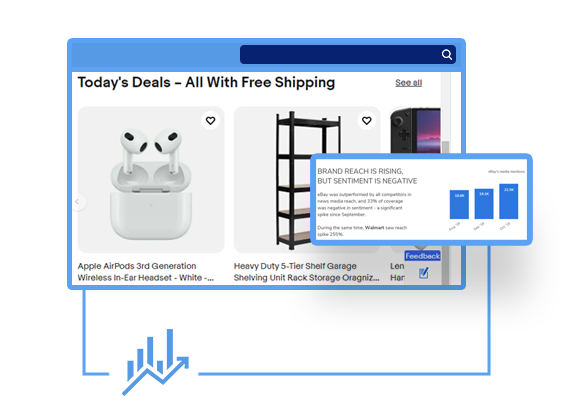
In this case study, we showcase our achievement in scraping ecommerce product prices and reviews from Amazon and eBay, benefiting our client. Leveraging advanced web scraping tools, including Python's BeautifulSoup and requests, we systematically extracted valuable data. Our methodology involved meticulous examination of HTML structures, precise extraction of pertinent elements, and sentiment analysis application for comprehensive review interpretation. This initiative empowered our client with up-to-date market insights, fostering competitiveness. We maintained ethical scraping practices, adhering to website policies for responsible and compliant data extraction.
Our client, a thriving e-commerce enterprise, enlisted our expertise in e-commerce data scraping services. Focused on gathering crucial insights, we specialize in extracting comprehensive information from various platforms, including product prices and reviews. We ensure accurate and real-time data acquisition by employing advanced scraping techniques, such as Python's BeautifulSoup and requests. This collaboration equips our clients with a competitive edge, allowing them to make informed decisions based on the dynamic market landscape.
Data Volume and Scale: The sheer volume of products and reviews on e-commerce platforms can present a significant challenge. Managing and processing large datasets efficiently becomes crucial, demanding optimized scraping techniques to handle the scale without compromising performance.
Unstructured Data Formats: E-commerce websites may present product and review information in unstructured formats. Scrape e-commerce product prices and review data using sophisticated parsing methods to handle variations in content presentation and maintain data integrity.
Authentication and User Sessions: Some e-commerce sites require user authentication or maintain session-based data. Scraping data accessible only after logging in poses additional complexities, requiring implementing authentication procedures to simulate user interactions.
Variability in Review Sentiments: Analyzing sentiment from user reviews using an e-commerce data scraper introduces challenges due to the variability in language expression. Developing practical sentiment analysis algorithms that account for the nuances and context of diverse customer sentiments becomes essential for accurate insights.


We implemented a distributed scraping architecture using cloud services to handle large datasets efficiently. We employed parallel processing techniques to scale the scraping operation, ensuring timely extraction of product prices and reviews without compromising performance.
We developed adaptable scraping algorithms using machine learning and natural language processing (NLP) to interpret and extract structured data from diverse presentation formats. It enabled us to handle variations in content structure across different e-commerce platforms.
We integrated automated login procedures into our scraping scripts, simulating user authentication and maintaining session information. It allowed us to access restricted data by replicating user interactions and navigating through authenticated sections of the websites.
We enhanced sentiment analysis algorithms by incorporating machine learning models trained on diverse datasets. We leveraged context-aware analysis to understand the nuanced expressions in user reviews better, ensuring more accurate sentiment categorization and meaningful insights.
HTML Parsing: Used Python's BeautifulSoup to efficiently extract product prices and review details from e-commerce websites.
XPath Navigation: Employed XPath expressions to navigate complex HTML structures, facilitating targeted data extraction.
Headless Browsing: Implemented Selenium for dynamic content handling, interacting with JavaScript-rendered pages for comprehensive data retrieval.
API Integration: Leveraged official e-commerce platform APIs when available, ensuring structured data extraction and compliance with website policies.


Efficiency and Speed: iWeb Data Scraping automates data extraction for increased efficiency and quicker access to valuable information.
Accuracy and Precision: Utilizing advanced parsing techniques, the company ensures precise extraction, minimizing errors in collected data
Large-Scale Data Collection: The platform enables simultaneous large-scale data collection from diverse sources, ideal for extensive business analysis.
Real-Time Data Updates: Real-time data updates empower businesses to stay current with market trends and make timely decisions.
Competitive Intelligence: The company provides a competitive edge by monitoring competitors' prices, products, and market strategies, facilitating strategic optimization.
Final Outcome: We succeeded in scraping product prices and reviews, harnessing our expertise in data extraction. Leveraging this valuable dataset, we empowered our clients with actionable insights for informed decision-making. The scraped data provided a comprehensive understanding of market trends, competitor pricing, and customer sentiments. This strategic advantage allowed our client to optimize pricing strategies, enhance product offerings, and stay ahead in a dynamic business landscape, demonstrating the impactful results of our proficient data scraping capabilities.
We start by signing a Non-Disclosure Agreement (NDA) to protect your ideas.
Our team will analyze your needs to understand what you want.
You'll get a clear and detailed project outline showing how we'll work together.
We'll take care of the project, allowing you to focus on growing your business.